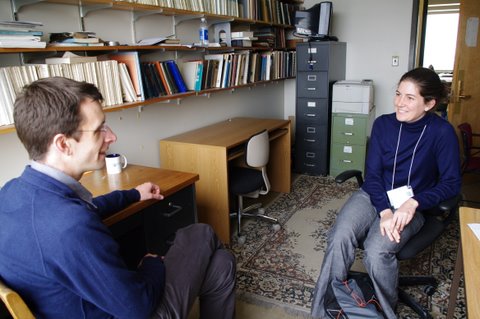News | September 13, 2011
Paleoclimatologist and Dust Expert, David McGee joins PAOC
PAOC welcomes new faculty member David McGee.

McGee’s general interest is paleoclimatology. More specifically, he has focused on reconstructing past changes in extratropical atmospheric circulation and hydrology. He has explored this area through studies of dust blown out of the world’s drylands and deposited in the ocean; changes in dryland water balance as reflected in closed-basin lakes; and studies of precipitation source and amount recorded in stalagmites. These studies involve a variety of types of data, but at the center of all of them are uranium-series isotopes, which are used for dating in terrestrial deposits and determination of accumulation rates in marine sediments. He is currently visiting MIT pending joining the faculty as an Assistant Professor of Paleoclimate at the beginning of next year.
After teaching mostly middle and high school for 7 years after college, McGee entered grad school at Tulane University in New Orleans. He says, “My wife was on the faculty there, so that’s where I enrolled”. Their evacuation to NYC during Katrina showed them that things were better both personally and professionally further north, so after finishing his masters at Tulane, the couple moved up to New York City for good. David did his Ph.D. at Columbia University/Lamont-Doherty Earth Observatory working with Wally Broecker, Bob Anderson and Gisela Winckler. As of now, he is in the last few months of a two-year NOAA-sponsored postdoc at the University of Minnesota, where he is working with Larry Edwards.
At MIT McGee will be working on two particular projects: One, using dust records to understand the past swings between wet and dry conditions in North Africa. A second will use lake and cave deposits to determine the timing and magnitude of past wet and dry events in the U.S. Great Basin.
When he is not hard at work doing paleoclimatology, he can typically be found playing with his son’s wooden train set or enjoying “non-extreme” outdoor activities (hiking, canoeing, running, biking). He also enjoys singing in small groups and, over the years, has been a part of a number of different small chamber and church choirs.
You can find Prof. McGee in E25-625. His email is davidmcg@mit.edu.
Story by Helen Hill, PAOC




